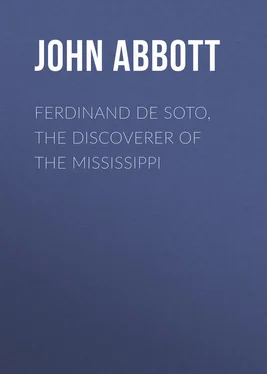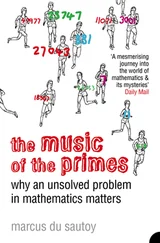John Abbott - Ferdinand De Soto, The Discoverer of the Mississippi
Здесь есть возможность читать онлайн «John Abbott - Ferdinand De Soto, The Discoverer of the Mississippi» — ознакомительный отрывок электронной книги совершенно бесплатно, а после прочтения отрывка купить полную версию. В некоторых случаях можно слушать аудио, скачать через торрент в формате fb2 и присутствует краткое содержание. Жанр: foreign_antique, foreign_prose, на английском языке. Описание произведения, (предисловие) а так же отзывы посетителей доступны на портале библиотеки ЛибКат.
- Название:Ferdinand De Soto, The Discoverer of the Mississippi
- Автор:
- Жанр:
- Год:неизвестен
- ISBN:нет данных
- Рейтинг книги:3 / 5. Голосов: 1
-
Избранное:Добавить в избранное
- Отзывы:
-
Ваша оценка:
- 60
- 1
- 2
- 3
- 4
- 5
Ferdinand De Soto, The Discoverer of the Mississippi: краткое содержание, описание и аннотация
Предлагаем к чтению аннотацию, описание, краткое содержание или предисловие (зависит от того, что написал сам автор книги «Ferdinand De Soto, The Discoverer of the Mississippi»). Если вы не нашли необходимую информацию о книге — напишите в комментариях, мы постараемся отыскать её.
Ferdinand De Soto, The Discoverer of the Mississippi — читать онлайн ознакомительный отрывок
Ниже представлен текст книги, разбитый по страницам. Система сохранения места последней прочитанной страницы, позволяет с удобством читать онлайн бесплатно книгу «Ferdinand De Soto, The Discoverer of the Mississippi», без необходимости каждый раз заново искать на чём Вы остановились. Поставьте закладку, и сможете в любой момент перейти на страницу, на которой закончили чтение.
Интервал:
Закладка:
General Espinosa, who was now chief in command, meanly sacked the defenceless village and captured all the women and children, to be sent to the West Indies and sold as slaves. The generous heart of De Soto was roused by this outrage. He was an imperious man, and was never disposed to be very complaisant to his superiors. Sternly the young captain rebuked Espinosa as a kidnapper, stealing the defenceless; and he demanded that the prisoners should be set at liberty. An angry controversy ensued. De Soto accused Espinosa of cowardice and imbecility, in ordering the troops of Spain to retreat before naked savages. Espinosa, whose domineering spirit could brook no opposition, accused De Soto of mutinous conduct, and threatened to report him to the governor. De Soto angrily turned his heel upon his superior officer and called upon his troops to mount their horses. Riding proudly at their head, he approached the tent of Espinosa and thus addressed him:
"Señor Espinosa, the governor did not place me under your command, and you have no claim to my obedience. I now give you notice, that if you retain these prisoners so cruelly and unjustly captured, you must do so at your own risk. If these Indian warriors choose to make any attempt to recover their wives and their children, I declare to you upon my solemn oath, and by all that I hold most sacred, that they shall meet with no opposition from me. Consider, therefore, whether you have the power to defend yourself and secure your prey, when I and my companions have withdrawn from this spot."
Pizarro does not seem to have taken any active part in this dispute, though he advised the headstrong Espinosa to give up his captives. While these scenes were transpiring, about one hundred of the men of the village returned. Most earnestly they entreated the release of their wives and children. If not peacefully released, it was pretty evident that they would fight desperately for their rescue. It was quite apparent that the Indian runners had gone in all directions to summon others to their aid. The withdrawal of De Soto left Espinosa so weakened that he could hardly hope successfully to repel such forces. Indeed he was so situated that, destitute of provisions and ammunition, he did not dare to undertake a march back through the wilderness to Darien. He therefore very ungraciously consented to surrender his captives.
Governor Don Pedro had established his headquarters at Panama. De Soto, accompanied by a single dragoon, who like himself was an admirable horseman, rode with the utmost possible dispatch to Panama, where he informed the governor of the disasters which had befallen the expedition, and of the precarious condition in which he had left the remnant of the troops. He also made such representation of the military conduct of General Espinosa as to induce the governor to remove him from the command and send General Herman Ponce to take his place. The garrison at Panama was then so weak that only forty men could be spared to go to the relief of the troops at Borrica.
In the mean time the Indian chief Uracca had received full information of the position and condition of the Spanish troops. Very sagaciously he formed his plan to cut off their retreat. Detachments of warriors were placed at every point through which they could escape; they could not venture a league from their ramparts on any foraging expedition, and no food could reach them. They obtained a miserable subsistence from roots and herbs.
At length De Soto returned with a fresh supply of ammunition and the small reinforcement. By the aid of his cavalry he so far broke up the blockade as to obtain food for the famishing troops. Still it was very hazardous to attempt a retreat to Panama. With the reinforcements led by General Ponce, their whole army, infantry and cavalry, amounted to less than one hundred and fifty men. They would be compelled on their retreat to climb mountains, plunge into ragged ravines, thread tropical forests and narrow defiles, where armies of uncounted thousands of natives were ready to dispute their passage.
CHAPTER III
Life at Darien
Reinforcements from Spain. – Aid sent to Borrica. – Line of Defense Chosen by the Natives. – Religion of the Buccaneers. – The Battle and the Rout. – Strategy of Uracca. – Cruelty of Don Pedro. – The Retreat. – Character of Uracca. – Embarrassment of Don Pedro. – Warning of M. Codro. – Expedition of Pizarro. – Mission of M. Codro. – Letter of De Soto to Isabella.
While governor Don Pedro was awaiting with intense anxiety the receipt of intelligence from Borrica, a ship arrived from Spain bringing three or four hundred adventurers, all of whom were eager for any military expedition which would open to them an opportunity for plunder. One hundred and fifty of these were regular soldiers, well taught in the dreadful trade of war. Don Pedro took these fresh troops and one hundred and fifty volunteers; and set out with the utmost expedition for Borrica. His impetuous nature was inspired with zeal to retrieve the disgrace which had befallen the Spanish arms. He took with him several pieces of ordnance, – guns with which the Indians thus far had no acquaintance.
Upon arriving at Borrica he very earnestly harangued his troops, reminding them of the ancient renown of the Spanish soldiers, and stimulating their cupidity by the assurance that the kingdom of Veragua, over which Uracca reigned, was full of gold; and that all that was now requisite for the conquest of the country and the accumulation of princely wealth, was a display of the bravery ever characteristic of Spanish troops.
There was a deep and rapid river, the Arva, rushing down from the mountains, which it was necessary for the Spaniards to cross in their renewed invasion of Veragua. On the northern banks of this stream Uracca stationed his troops, selecting this spot with much skill as his main line of defence. He however posted an advanced guard some miles south of the stream in ground broken by hills, rocks and ravines, through which the Spaniards would be compelled to pass, and where their cavalry could be of very little avail.
By great effort Don Pedro had collected an army of about five hundred men. Rapidly marching, he soon reached the spot of broken ground where the native troops were stationed awaiting their approach.
It seems almost incomprehensible that this band of thieves and murderers, who, without the slightest excuse or provocation, were invading the territory of the peaceful natives, carrying to their homes death and woe, that they might acquire fame for military exploits and return laden with plunder, could have looked to God for his blessing upon their infamous expedition. But so it was. And still more strange to say, they did not apparently engage in these religious services with any consciousness of hypocrisy. The thoughtful mind is bewildered in contemplating such developments of the human heart. Previous to the attack the whole army was drawn up for prayers, which were solemnly offered by the ecclesiastics who always accompanied these expeditions. Then every soldier attended the confessional and received absolution. Thus he felt assured that, should he fall in the battle, he would be immediately translated to the realms of the blest.
Thus inspired by military zeal and religious fanaticism, the Spaniards rushed upon the natives in a very impetuous assault. We are happy to record that the natives stood nobly on the defence. They met their assailants with such a shower of arrows and javelins that the Spaniards were first arrested in their march, then driven back, then utterly routed and put to flight. In that broken ground where the cavalry could not be brought into action, where every native warrior stood behind a tree or a rock, and where the natives did not commence the action till the Spaniards were within half bow shot of them, arrows and javelins were even more potent weapons of war than the clumsy muskets then in use.
Читать дальшеИнтервал:
Закладка:
Похожие книги на «Ferdinand De Soto, The Discoverer of the Mississippi»
Представляем Вашему вниманию похожие книги на «Ferdinand De Soto, The Discoverer of the Mississippi» списком для выбора. Мы отобрали схожую по названию и смыслу литературу в надежде предоставить читателям больше вариантов отыскать новые, интересные, ещё непрочитанные произведения.
Обсуждение, отзывы о книге «Ferdinand De Soto, The Discoverer of the Mississippi» и просто собственные мнения читателей. Оставьте ваши комментарии, напишите, что Вы думаете о произведении, его смысле или главных героях. Укажите что конкретно понравилось, а что нет, и почему Вы так считаете.












